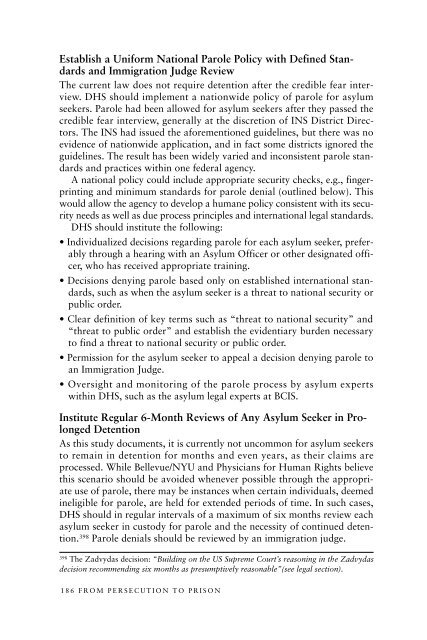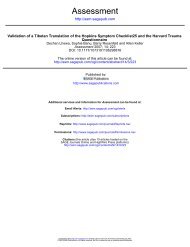From Persecution to Prison - Bellevue/NYU Program for Survivors of ...
From Persecution to Prison - Bellevue/NYU Program for Survivors of ...
From Persecution to Prison - Bellevue/NYU Program for Survivors of ...
Create successful ePaper yourself
Turn your PDF publications into a flip-book with our unique Google optimized e-Paper software.
Establish a Uni<strong>for</strong>m National Parole Policy with Defined Standardsand Immigration Judge ReviewThe current law does not require detention after the credible fear interview.DHS should implement a nationwide policy <strong>of</strong> parole <strong>for</strong> asylumseekers. Parole had been allowed <strong>for</strong> asylum seekers after they passed thecredible fear interview, generally at the discretion <strong>of</strong> INS District Direc<strong>to</strong>rs.The INS had issued the a<strong>for</strong>ementioned guidelines, but there was noevidence <strong>of</strong> nationwide application, and in fact some districts ignored theguidelines. The result has been widely varied and inconsistent parole standardsand practices within one federal agency.A national policy could include appropriate security checks, e.g., fingerprintingand minimum standards <strong>for</strong> parole denial (outlined below). Thiswould allow the agency <strong>to</strong> develop a humane policy consistent with its securityneeds as well as due process principles and international legal standards.DHS should institute the following:• Individualized decisions regarding parole <strong>for</strong> each asylum seeker, preferablythrough a hearing with an Asylum Officer or other designated <strong>of</strong>ficer,who has received appropriate training.• Decisions denying parole based only on established international standards,such as when the asylum seeker is a threat <strong>to</strong> national security orpublic order.• Clear definition <strong>of</strong> key terms such as “threat <strong>to</strong> national security” and“threat <strong>to</strong> public order” and establish the evidentiary burden necessary<strong>to</strong> find a threat <strong>to</strong> national security or public order.• Permission <strong>for</strong> the asylum seeker <strong>to</strong> appeal a decision denying parole <strong>to</strong>an Immigration Judge.• Oversight and moni<strong>to</strong>ring <strong>of</strong> the parole process by asylum expertswithin DHS, such as the asylum legal experts at BCIS.Institute Regular 6-Month Reviews <strong>of</strong> Any Asylum Seeker in ProlongedDetentionAs this study documents, it is currently not uncommon <strong>for</strong> asylum seekers<strong>to</strong> remain in detention <strong>for</strong> months and even years, as their claims areprocessed. While <strong>Bellevue</strong>/<strong>NYU</strong> and Physicians <strong>for</strong> Human Rights believethis scenario should be avoided whenever possible through the appropriateuse <strong>of</strong> parole, there may be instances when certain individuals, deemedineligible <strong>for</strong> parole, are held <strong>for</strong> extended periods <strong>of</strong> time. In such cases,DHS should in regular intervals <strong>of</strong> a maximum <strong>of</strong> six months review eachasylum seeker in cus<strong>to</strong>dy <strong>for</strong> parole and the necessity <strong>of</strong> continued detention.398 Parole denials should be reviewed by an immigration judge.398The Zadvydas decision: “Building on the US Supreme Court’s reasoning in the Zadvydasdecision recommending six months as presumptively reasonable”(see legal section).186 FROM PERSECUTION TO PRISON



